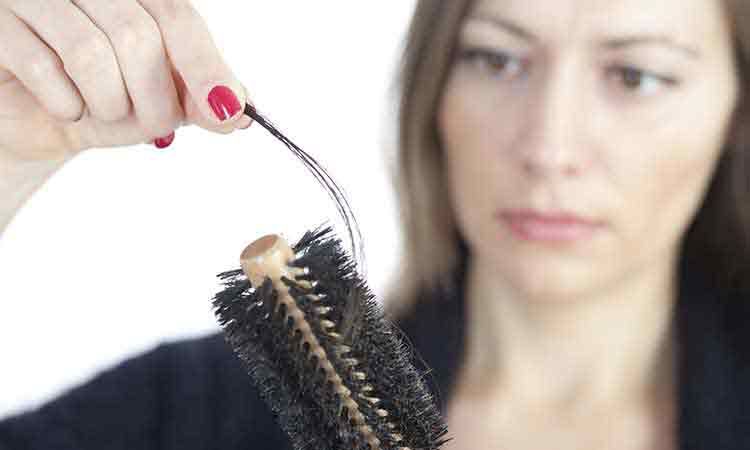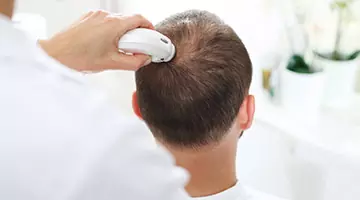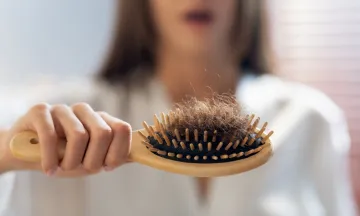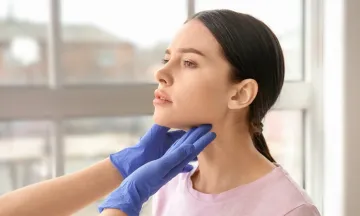Hair Loss and Hormonal Imbalance
Hair fall is a common problem faced by men and women today. According to global Google statistics, 59% of women and 77% of men between the ages of 25-44 are looking for hairfall solutions. Some common causes of hair loss in men and women include humidity, stress levels, chemical treatments and dandruff.
Did you know! Hormones can cause hair fall in men and women?
Hormones play an important role in our body. It is the chemical messenger of the body that regularizes several major bodily functions, such as metabolism and reproduction. Hormonal imbalance occurs when your body's hormones or glands stop functioning properly; this can lead to hair fall problems.
It is normal to lose 50 to 100 strands of hair in a day. This is a part of your normal hair growth cycle that includes three different phases namely, the anagen phase, where the hair grows from the roots, the catagen phase where the hair separates itself from the roots and finally, the telogen phase here the separated strands settles in the root. However, when there is a hormonal imbalance, it can interfere with this cycle.
Hormones that can cause hair loss
- Oestrogen: In a women’s body, theOestrogen hormone, plays an important role.Oestrogen levelsmanage puberty, the menstrual cycle, bone strength, pregnancy and normal cholesterol levels.The three types of oestrogen hormones produced in a women’s body include hormones produced duringchildbearing, pregnancy and after menopause.An increase in Oestrogen levels can be caused by weight gain and perimenopause; this leads to hair thinning. During and after pregnancy, for example, oestrogen levels peak and then dip, causing sudden hair loss for many women.
It can also helpyou feel energized, control your mood swings tomake your hair growth phase last longer and improve hair quality.
Also Read: Pregnancy and Hair Loss
- Oral Contraceptive Pills: Oral contraceptive (OC) pills are an artificial or additional source of oestrogen for the body. When the supply of ‘artificial oestrogen’ is stopped, the body reacts to the sudden ‘oestrogen withdrawal.’ As a result, testosterone levels rise and cause significant hair loss.
- Testosterone: It is primarily a male hormone, although women produce minor amounts of the hormone. This distinguishes men from boys by causing thick hair growth on the body, particularly on the chest, abdomen, arms, legs and face.
When testosterone is converted to DHT, hair growth is suppressed, especially on the head. Male pattern baldness is the end result (MPB). Due to a higher concentration of oestrogen in women, testosterone effects are usually reduced which can lead to Female Pattern Baldness (FPB).
- Andropause: When a man turns 50, he goes through a medically recognized phase known as Andropause. He may encounter daily or monthly shifts in his hormones, which can have an impact on his mood, emotions, and biological processes. His body starts to produce lower levels of testosterone, which can result in hair loss on the scalp.
- Menopause: The hormones in women's bodies change during menopause. Women gain weight, suffer mood swings and experience hot flushes (night sweats). Menopause can also cause a disruption in the menstrual cycle, which can result in hair loss.
- Lifestyle: The hormonal processes of your body might also be influenced by your daily activities. Everything you eat, as well as any habits you may have, can cause problems with your hormone levels. A slight shift in your lifestyle can have a significant impact on your health. Apples, blueberries, spinach, green tea, avocado and broccoli are all nutrient-dense foods that help manage hormonal imbalance. It is important to avoid eating processed food, reduce alcohol consumption and smoking, and improve your sleep pattern.This can help treat hormonal imbalance.
- Medical Conditions: Hormonal imbalance can also be caused by some drugs. Medications used to treat cancer, gout, high blood pressure and arthritis can cause a hormonal imbalance, which can result in hair loss. This hair loss may be temporary, but if left untreated for too long, it can cause permanent damage.
- Insulin: Insulin is the hormone that regulates blood sugar levels, has an impact on a variety of bodily functions; including fat storage, heart health and hair growth. According to a research study by the European Journal of Cardiovascular Risk, Insulin resistance in Women can lead to a higher risk of androgenic alopecia (AGA) or female pattern baldness.
- PCOS: Polycystic ovary syndrome (PCOS) is a condition that is caused by a hormonal imbalance. When women begin to produce large amounts of male hormones, it can disrupt their menstrual cycle and affect them during their childbearing years. PCOS can also cause excess hair growth on the face and excess hair loss on the scalp.
Self-Care Tip!
These can be reasons for hormonal imbalance and hair loss. It is important to manage your stress levels, get adequate amount of sleep, avoid sugar and control your eating habits, and exercise. These will help you maintain a healthy hormonal balance and protect your hair from future damage.
Homeopathy treatment for hair fall
We understand that hair loss can beupsetting! Stress, illness, nutrient deficiencies, hormonal imbalance,taking certain medicines and systemic inflammation;all can be reasons for hair loss in men and women. Homeopathic treatment offers a holistic and in-depth diagnosis of your hair fall problems, giving effective treatment solutions. According to the National Center for Biotechnology Information (NCBI),Thujacan promote effective hair growth.
Hair fall treatment by Dr Batra’s®
Dr Batra’s® New Hair, is India’s first bio-engineered and FDA-approved hair fall treatment that is safe, non-surgical, non-invasive and side effect free. This treatment by Dr Batra’s® stimulates the hair follicles to help with hair re-growth and thickness. It is equally important to address the root cause of the problem for an effective solution. With Homeopathy treatment at Dr Batra’s®, you can treat hair loss and the underlying problems in a safe, natural and side-effect-free way. Our expert homeopathic doctors devise a treatment plan that best suits your condition. As authenticated by the American Quality Assessors, we have a satisfaction rate of 96.6% in treating hair loss problems.
FAQ’s
1. How do I balance my hormones to stop hair loss?
To balance your hormones and inturn, stop hair fall, consume nutrient-dense foods such as apples, blueberries, spinach, green tea, avocado and broccoli.Hormones can regularize several major bodily functions such as metabolism and reproduction. When the hormones or glands in your body stop functioning normally, it can lead to a hormonal imbalance. And, this can cause hair fall in men and women.
2. What hormone imbalance can cause hair loss?
The hormonal imbalance that is caused by high oestrogen levels in the body can damage the hair follicles and lead to an increase in hair fall. Hormones play an important role in our body. It helps to regularize major bodily functions, such as the metabolism and reproduction.Hence, it is important to treat hormonal imbalance to reduce hair fall problems.
3. What hormone makes your hair grow?
There are no hormones that can help with hair growth on the scalp. But, with an increase in the levels of androgen hormones like the dehydroepiandrosterone sulfate and testosterone; they can cause excess hair growth on the body and the face.
4. Does hormonal hair loss grow back?
It is normal to lose 50 to 100 strands of hair in a day. This is a part of the normal hair growth cycle. Humidity, stress levels, chemical treatments and dandruff can also be reasons for hair loss. But, hormonal imbalancesare a major cause of hair loss in men and women. However, the hair loss caused by hormonal imbalance is temporary, hence, it can grow back. But, it is difficult to prove how and when the hair regrowth will occur.
5. How can I control my hair fall due to hormonal imbalance?
A minor lifestyle change can help you reduce hair fall caused by hormonal imbalance. Nutrient-dense foods such as apples, blueberries, spinach, green tea, avocado and broccoli can help reduce the hormonal imbalance. Furthermore, to maintain a healthy hormonal balance and reduce further damage of your hair; it is important to improve your sleep pattern,avoid the consumption of processed food, alcohol andsmoking.






